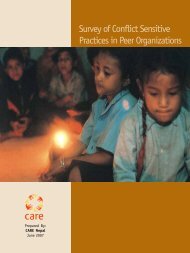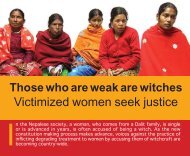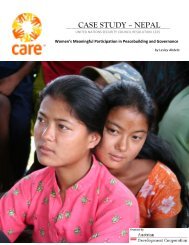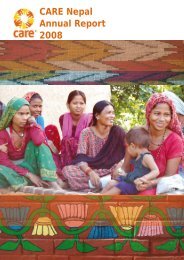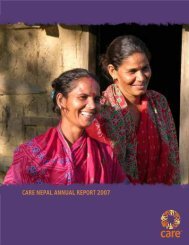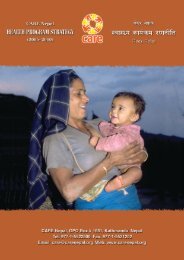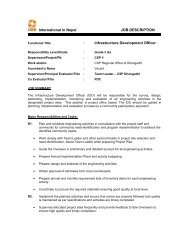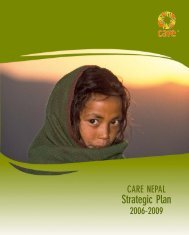Untitled - Care Nepal
Untitled - Care Nepal
Untitled - Care Nepal
You also want an ePaper? Increase the reach of your titles
YUMPU automatically turns print PDFs into web optimized ePapers that Google loves.
“If we go to meet some friends from mothers<br />
group to share problems, then society criticizes<br />
us by saying that for the sake of money we go to<br />
INGO and NGO but the fact is only<br />
known by us”.<br />
“There is a belief that if girls are married before<br />
their menstruation period they will go to heaven<br />
after their death, thus they are married at their<br />
early ages, bear children at young stage and<br />
suffer through weakness. Hence they<br />
become unhealthy”.<br />
(A woman aged 22, Unmarried, Dalit,<br />
teacher in Makawanpur)<br />
The focus group discussion with men<br />
illustrated that they were not well-informed<br />
about the interests of women or the likes,<br />
dislikes and wishes of women. It was<br />
identified that men did not give attention<br />
towards the wishes of women.<br />
“They need to do their work whether they<br />
like it or not, so why should women<br />
complain? It does not make any sense”, said<br />
by the FGD participated men in Chitwan.<br />
From the perception of different FGD<br />
groups (landless, Dalit, Janajati, men), the<br />
issues identified were different. The<br />
respondents said that Brahmin and Chettri<br />
women have less freedom in terms of<br />
mobility, they receive less support from<br />
family members; and are more excluded and<br />
restricted by rituals than women of other<br />
castes. Dalit women complained more about<br />
the discrimination committed by so called<br />
upper caste people. Men indicated that they<br />
had little awareness of the needs and wishes<br />
of women and admitted that they never<br />
asked about these things.<br />
ECONOMIC ISSUES<br />
Almost all the KII respondents mentioned<br />
that economic factors are the major source<br />
of problems which restricted their lives. It<br />
was shared that women were forced to work<br />
as laborers to help their families survive.<br />
Without doing so, it was difficult to feed<br />
and take care of their children properly.<br />
Additionally, participants explained that<br />
even educated women as well as men went<br />
abroad to earn money. Still, women were<br />
not allowed to spend the money earned<br />
independently; they had to ask to their<br />
parents in -laws for permission to spend<br />
money even though it was sent to them by<br />
their husband from abroad.<br />
Research participants mentioned that due<br />
to a lack of money, women could not go to<br />
the market. This resulted in a difficulty to<br />
feed and take care of their children properly.<br />
As a result they had to work as laborer<br />
unwillingly.<br />
Similarly landless women expressed their<br />
view regarding the unavailability of land.<br />
They shared that they had to survive by dong<br />
work in other’s home for 6 months which<br />
created lot of work pressure to women. It<br />
was found that land less women from<br />
Chitwan have had multiple difficulties. It<br />
was shared by the women that they were<br />
fearful that army would destroy the houses<br />
or would threaten them to leave as their<br />
houses are nearby the national park.<br />
Moreover women shared that they have a<br />
fear of criminal groups who come from<br />
22<br />
Psychosocial Issues of<br />
Women affected by conflict



